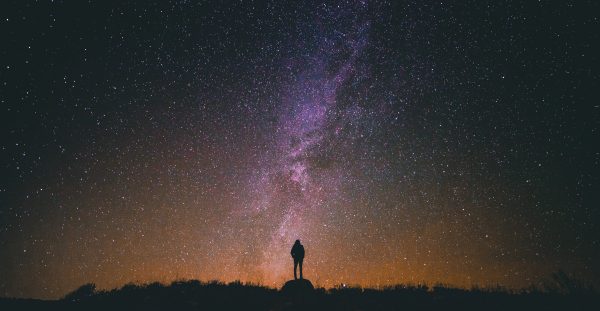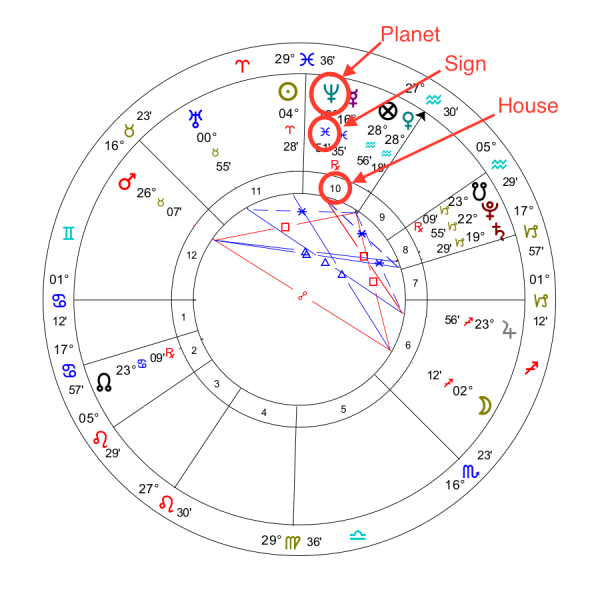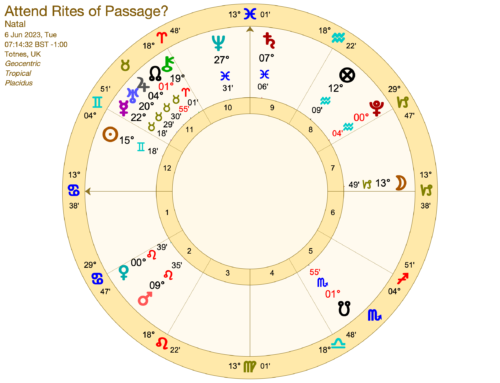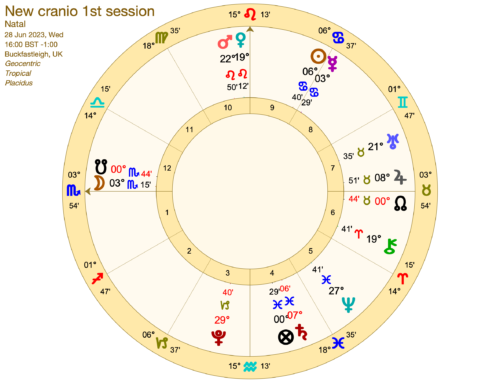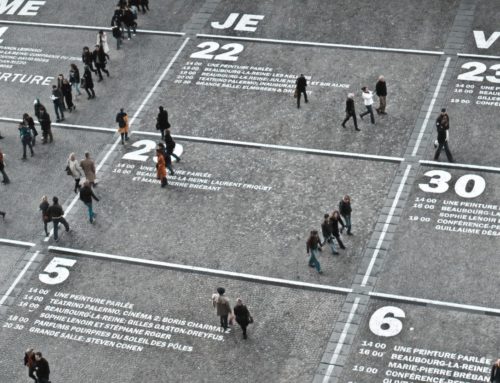What Astrology Really Is and How It Works
There are many misconceptions about what astrology is and how it works, both from those of a scientific mind and also from those of a more spiritual inclination. I used to be a complete sceptic about astrology until I accidentally found myself in a 1-hour talk on the subject back in 2010, which not only changed my whole understanding of astrology, but also eventually led to me practising it professionally. This was something of a departure from my previous career as a Computer Programmer.
It is somewhat unfortunate that daily horoscopes are so mainstream, since it means the majority of people know ‘astrology’ and no sane person could believe that the same few lines of text could apply to 1/12 of the entire population. Yet this is not really astrology.
My intention here is not to try and convince sceptics that astrology is valid, but simply to explain to those with an open mind the broader perspective of astrology and how it can help us to understand the entire nature of our lives on earth (so nothing too ambitious then!).
As somebody who has delved deeply into this subject every day for many years, I’d like to share my understanding of the nature of astrology, which just so happens to also say something of great importance about the nature of life itself and how it operates.
One of the common misconceptions about astrology is that it says the planets out there in space are influencing our lives and doing something to us here on Earth. However the relationship between the planets and our lives is a symbolic one, not a direct causal one. Astrology is a symbolic language. The different planets, signs and houses describe aspects of our personalities and our life and the events in it. But they do not cause it.
Synchronicity
It is not possible to understand this relationship by viewing life from a traditional scientific perspective. Rather it is necessary to recognise the interconnected nature of all things. That ultimately the whole of life is one expression. From this perspective something that happens on the macrocosm scale of the solar system – the movement of the planets – is reflected in and describes the microcosm – a person and their life.
“As above, so below” as the ancients said.
The connection between the two is an acausal one – synchronicity, as the psychiatrist, psychologist and astrologer Carl Jung called it. The position of the planets describe what is happening in our life in much the same way that the hands on a clock tell the time, but do not cause the time. The planets are not beaming cosmic rays down on us and influencing our lives.
I am not dismissing science and the incalculable benefits it has had on our lives. The amazing human intellect has come up with a very precise and powerful system that works within the realm it is designed to. If I want to build a bridge I’m going to use maths and engineering. If I need heart surgery I’m going to go to a surgeon. But if I want to understand the true nature of the Universe then science will never come up with the answers. It is a part of the whole trying to explain the whole. It’s the wrong tool.
Most scientists dismiss astrology out of hand, without ever investigating it. The reason for this is that astrology does not fit into their paradigm of how life works. Also, in the past some astrologers have misguidedly tried to prove astrology by statistical analysis. These have pretty much always failed, which to scientists is proof that astrology does not work. Really, it is proof only that astrology does not comply with statistical reasoning. To try and prove astrology by applying our current scientific models is the wrong approach. Science, as with everything else in our lives, can be found within the astrological framework, and so is not in a position to examine the container within which it is found.
It’s All About You
We know from science that the Solar System is heliocentric (i.e. everything revolves around the Sun). Astrology, though, is geocentric: the earth is at the centre. An astrology chart depicts the location of each of the planets, the Sun and the Moon from the place a person was born, at the time they were born. So it is essentially a local map of the heavens at the birth moment.
Being person-centred means that the chart shows something subjective about how a person sees and interacts with the world. One’s chart could be said to show the filter through which you see life. (Before studying astrology I genuinely thought that either people saw the world the same way I did, or if they didn’t then they should do!)
Our entire experience of life is through our perceptions, which are entirely subjective, and different for everyone. Ask a group of people to describe an event that they all just witnessed and each will have something different to say.
How we perceive life is described by our astrological make-up.
Context-Specific Collaboration
Astrology is a heavenly tool for helping us to understand ourselves and our lives more deeply. A personal session with an astrologer is very specific to the individual person, and so it makes no sense to try and analyse astrological factors across hundreds and thousands of people.
An astrological reading is not like a psychic session. An astrologer cannot look at a chart and tell all the details about a person’s life without any context. What he can do, though, is see from an archetypical perspective the key themes around whatever area of life the client wants to discuss. The session is a collaboration. The astrologer has the knowledge of the symbolism and the client has the knowledge of himself and his life. And armed with this contextual information the astrologer can provide guidance on the issue at hand.
For example if a client wants to know what they should do for a career, then the astrologer can describe the relevant themes in this area of their life and give a number of suggestions and possibilities that would fit the symbolism. And from this what matters is which of those resonate with the person. Maybe 1 or 2 out of 5 offered options would fit for them – then these are the right career options. And without talking to the client the astrologer could not know which of the possibilities is right in this instance.
So astrology is context-specific, and thus not applicable to statistical analysis.
Don’t Believe in Astrology
It is also not a belief system, as many people think. I am by nature a sceptic. Albeit an open-minded one. I take nothing on belief. So when I first began to understand what astrology really is, I studied my own chart and those of friends and family and came to see in my own experience that it worked. I encourage everyone to do the same – don’t believe in astrology, but learn about it with an open mind and then decide for yourself.
This is precisely what Professor Richard Tarnas did. The cultural historian was an astrological sceptic and decided to investigate for himself. And in doing so he had his whole understanding of the nature of life turned on its head. The result of his many years of study is his ground-breaking book Cosmos and Psyche: Intimations of a New World View, in which he describes literally hundreds of the most important events in world history and how they correlate precisely with the symbolism of the prevailing planetary movements.
While it’s a beast of a book, size-wise, if you are sceptical but open-minded about the possibility of astrology having validity then I highly recommend you have a read. His compelling evidence may just change the way you understand the entire nature of our existence on Earth.
Very Brief Overview of an Astrology Chart
To explain a little more as to why daily horoscopes are not true astrology, I want to mention just a little about what makes up an astrological chart. There are 10 celestial bodies, which are each in a particular sign of the zodiac and a house. Each factor has something important to say about the person. You have 10 bodies, 12 signs and 12 houses. Put simply:
The planet describes what energy is being expressed (and are archetypal in nature)
The sign of the zodiac describes how that energy is expressed
The house describes where the action takes place (houses represent areas of life including family, home, career, relationships, health, friends etc)
To give an example of one of the celestial bodies, the Sun symbolises our deepest sense of personal identity, our core essence and also the central components of our life path. It describes our own personal Hero’s Journey, to borrow Joseph Campbell’s phrase. The Sun is the centre of our Being around which our life revolves (symbolically shown by the fact that the Sun is the centre of the solar system and everything revolves around it).
People tend to be more like their Sun nature than anything else (which is why Sun signs are used in daily horoscopes). And so those of the same Sun sign will have certain characteristics in common. Yet to say something of detailed significance about a person’s Sun, we need to know not only which sign it is in, but also which house, and how it interacts with the other planets. It is the interweaving of all the different parts of a chart that make up the complete picture of a person. And any one chart is every bit as complex as the person it is describing.
Human beings are very complicated, often contradictory creatures, and this is reflected in a birth chart, where the different celestial bodies all tell a story about the different parts of ourselves, what they need, how they are likely to go about getting their needs met and what particular gifts and challenges a person has.
The archetypical symbolism of the planets and luminaries covers an enormous range of possible expressions. To give you just the briefest of examples:
The Moon describes our emotional nature and what we need to feel safe and secure
Mercury: our style of communication and thought processing
Venus: our relationship needs
Mars: our drive, motivation, courage and ability to take action
Astrology is Not Deterministic
In one sense, we could say it indicates a combination of both fate and free will. The fate aspect is shown by the configuration of your natal chart. If you have Sun in Scorpio then themes related to this archetype will always be a central component of your life. You cannot turn yourself into a Sagittarius no matter how hard you try.
Astrology can and will describe the key themes in a person’s life, but it doesn’t say exactly how these will play out and exactly what will happen. There are an almost infinite number of possible expressions of any placement in a chart and at the same time all of those expressions will relate in some way to the archetypical nature in question. And hence a skilled astrologer can, with the context given by the client, identify what the key lessons are in the real world event and provide guidance in how best to move forwards. The symbolism comes alive in the moment of discussion.
Astrology gives us insight into the energetic movements behind any event – the ‘wiring under the boards’ as Terence McKenna called it (in reference to shamanism, not astrology). For me it is a method by which the spiritual realm communicates with us. And in that sense is a form of divination (‘communion with spirits’). It is a way in which we are guided by the Unseen. As an astrologer I am the translator of these messages from the astrological language into the English language.
Astrology does not predict the future
Astrology is also sometimes perceived to be claiming it can predict the future – and again some astrologers do make this claim and usually end up being proven wrong. Even if I could tell somebody what was going to happen, why bother if it’s going to happen anyway?
What we can see are the ‘transits’ a person is going through. A transit is essentially where a planet as it is in the sky right now interacts closely with something in a person’s natal chart. And these transits will have important themes and lessons associated with them. So we can predict the archetypal experience someone will go through at a given time, and know the kinds of lessons life is trying to teach.
For example, everybody goes through his or her ‘Saturn Returns’ somewhere between the ages of 28-30. And in some way (how, specifically, depends on the individual chart) this will be a time where the person goes through a rite of passage into true adulthood. It involves one of more of these themes: commitment, hard work, discipline, responsibility, maturity, focus on the long-term, endings. And so common experiences at this time are getting married, having a child, changing careers or getting a big promotion. If something isn’t working in your life, it will most likely come to an end at this time. And if it is, then it’s time to take the next step. It is often a period of significant transition after which you view yourself and your life from a quite different perspective.
Likewise, the ‘Uranus Opposition’ transit that everyone has somewhere between 40 and 44 has a sense of ‘it’s now or never’ about it. A time where we feel impelled to make another big shift in our life to truly align ourselves with our own unique authentic expression and our soul’s purpose. This can be experienced as a ‘mid-life crisis’. It is sometimes called the ‘divorce aspect’, as confining relationships often come to an end at this time. This period can also involve a major leap of faith, where we take a big risk with no certainty as to what will happen. A leap that we feel compelled to make as our current life situation feels unbearably restrictive.
The movement of the planets are not causing these events in our lives, but act as a guidance system for what life wants for us at this time and how best to act to move in alignment and harmony with the Universe.
A Mystical Art, Not A Science
Some astrologers make the claim that astrology is a science. For me it is an art, which blends both logic and intuition. There is important structure to it and rules to be followed in interpreting a chart, and there is also at times the need for creativity imagination and inspiration in the process of discovering what the symbols are saying.
When I immerse myself in astrology I feel like I am looking into the mind of God (aka Consciousness / the Universe, not the old guy with the beard sitting on a cloud). Astrology describes to us the inner workings of the Universe.
If you have an inkling that there is more to your life than what you normally perceive, then a little astrological knowledge can be a tremendous bridge to the other side of the veil, through which you can gain deep insights into what your life is fundamentally about.

